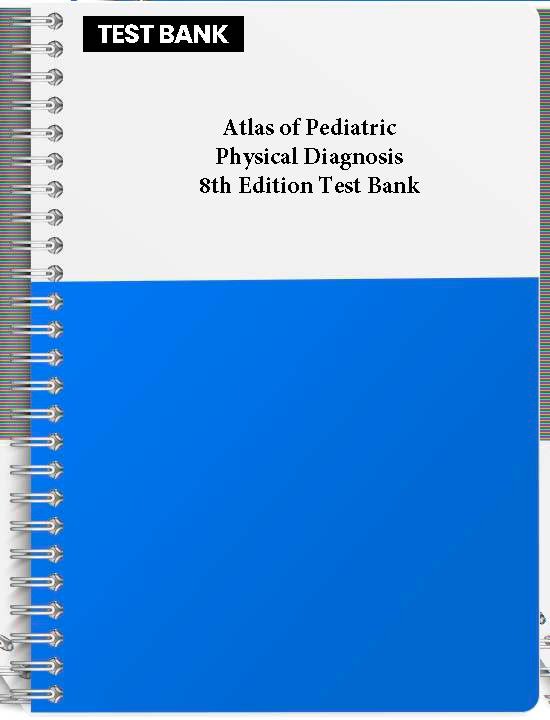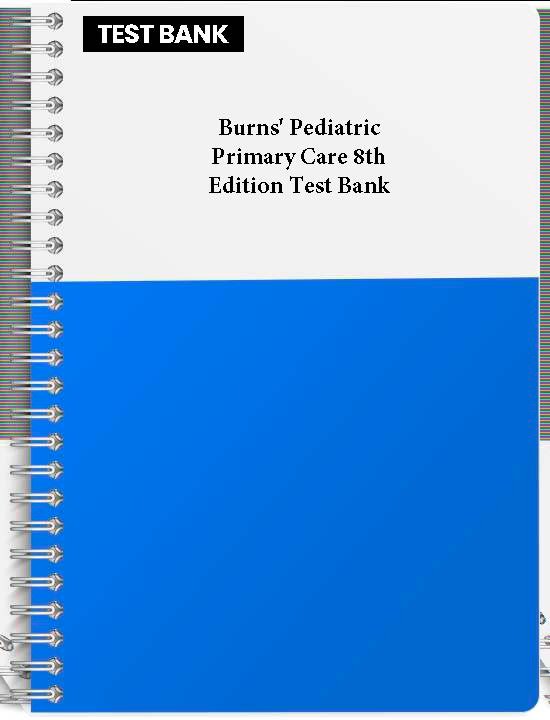Description
Child and Adolescent Behavioral Health: A Resource for Advanced Practice Psychiatric and Primary Care Practitioners in Nursing 2nd Edition Test Bank provides an essential resource for practitioners working with children and adolescents in psychiatric and primary care settings. This test bank is designed to reinforce key concepts, assess understanding, and apply clinical skills in the context of behavioral health challenges faced by younger populations. Here’s an overview of the main areas covered:
- Developmental Psychology and Milestones: Questions assess knowledge of typical developmental milestones and variations in cognitive, emotional, and social development. Topics include recognizing normal versus atypical behaviors at different ages and understanding how these inform mental health assessments.
- Psychiatric Assessment and Diagnosis: This section covers thorough psychiatric evaluations tailored to children and adolescents, focusing on age-appropriate communication, gathering history, and utilizing diagnostic criteria from the DSM-5 for common childhood disorders.
- Common Behavioral Health Disorders: Emphasizes conditions such as ADHD, autism spectrum disorder, anxiety disorders, depression, bipolar disorder, and conduct disorders. Questions test understanding of diagnostic criteria, symptomatology, and treatment approaches for these conditions.
- Therapeutic Interventions and Modalities: Examines therapeutic approaches, including cognitive-behavioral therapy (CBT), play therapy, family therapy, and pharmacologic treatments. The test bank includes questions on selecting appropriate interventions based on patient age, diagnosis, and family dynamics.
- Psychopharmacology for Pediatric Patients: Covers medication management, including understanding the effects, side effects, and safety considerations for psychiatric medications commonly used in children and adolescents. Topics include stimulants, antidepressants, mood stabilizers, and antipsychotics.
- Family Dynamics and Support Systems: Questions explore the role of family, school, and social support in behavioral health. This section emphasizes understanding family influences, building effective communication with caregivers, and involving family members in treatment plans.
- Screening and Early Intervention: Focuses on early detection of behavioral health issues and the importance of early intervention strategies. Questions test knowledge on screening tools, risk factors, and preventive measures to identify and address concerns early.
- Cultural and Socioeconomic Considerations: Examines how cultural background, socioeconomic factors, and family values influence behavioral health assessment and treatment in children and adolescents, highlighting the importance of culturally sensitive care.
1 Child, Adolescent, and Family Development
2 Temperament and Self-Regulation
3 Neurobiology and Neurophysiology of Behavioral/Psychiatric Disorders
4 Integration of Physical and Psychiatric Assessment
5 Child Sexual Development
6 Adolescent Sexual Behaviors
7 Assessing and Managing the Needs of LGBTQ Youth
8 Adverse Childhood Experiences: Providing Trauma-informed Care to Promote Resilience in Children and Their Families in Health Settings
9 Psychopharmacology: Issues in Prescribing Psychiatric Medication to Children and Adolescents
10 Attention Deficit Hyperactivity Disorder
11 Anxiety Disorders
12 Mood Dysregulation Disorders
13 Deliberate Self-harm: Nonsuicidal Self-injury and Suicide in Children and Adolescents
14 Perceptual Alterations Disorders
15 Feeding and Eating Disorders in Children and Adolescents
16 Autism Spectrum Disorder
17 Learning and Intellectual Disabilities
18 Nonpharmacological Treatment Modalities: Play and Group Therapies
19 Individual and Family Therapies
20 Cognitive Behavioral Interventions in Child and Adolescent Mental Health Treatment
21 Disorders Specific to Infants and Young Children
22 Juvenile Justice Populations
23 Substance Use
24 Child and Adolescent Victims of Trauma
25 Children in Out-of-Home Placement
26 Chronic and Palliative Care Pediatric Populations
27 Collaborative Treatment with Primary Care
28 Legal and Ethical Issues
29 Evidence-based Nursing Practice
30 Cultural Influences on Child and Adolescent Mental Health: Needs of Immigrant, Refugee, Displaced, and Culturally Vulnerable Youth
31 Conducting Behavioral Health Research with Children and Using Research Methods
32 Advanced Practice Registered Nurses Interfacing with the School System
33 Child and Adolescent Mental Health Policy









Reviews
There are no reviews yet.